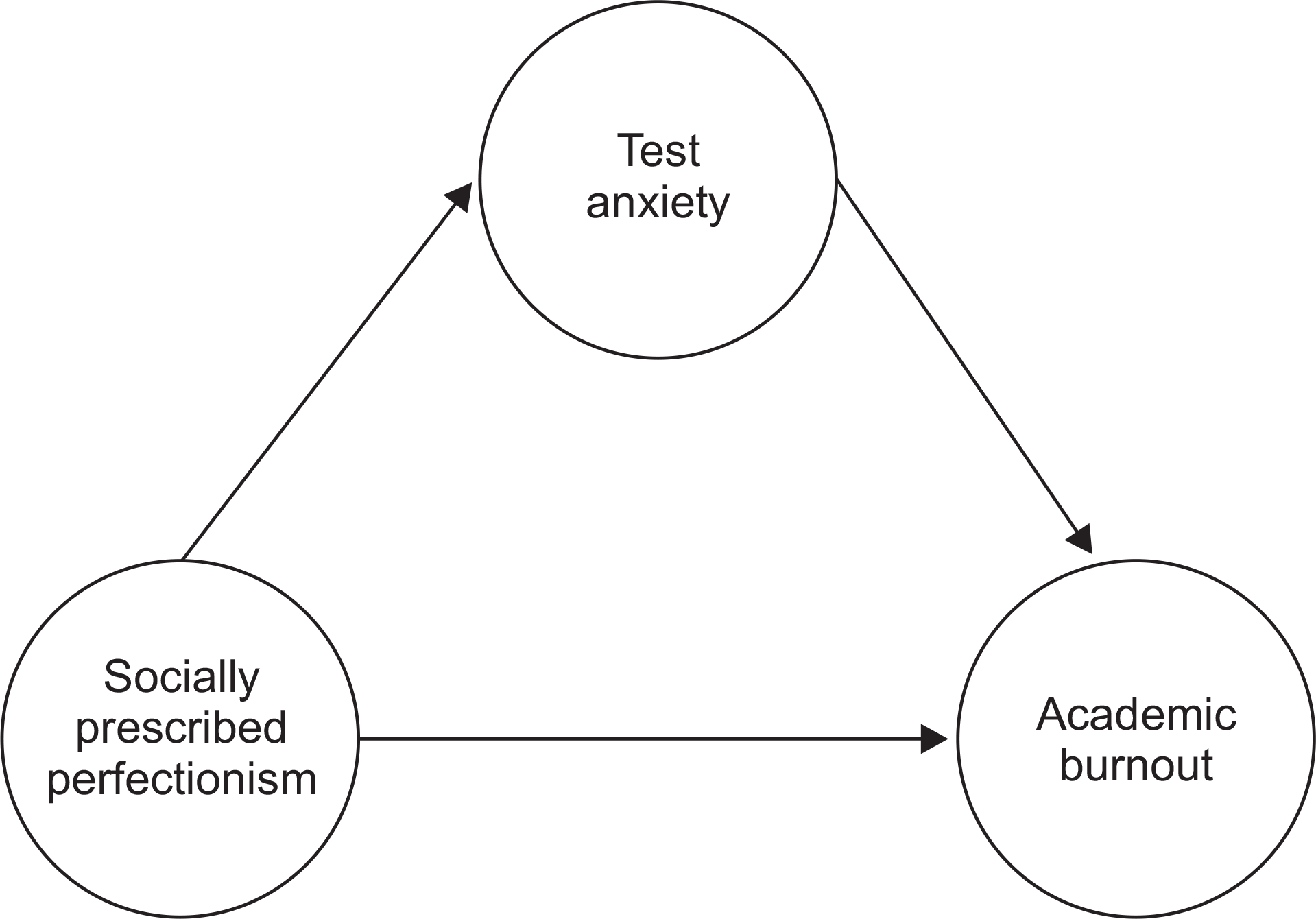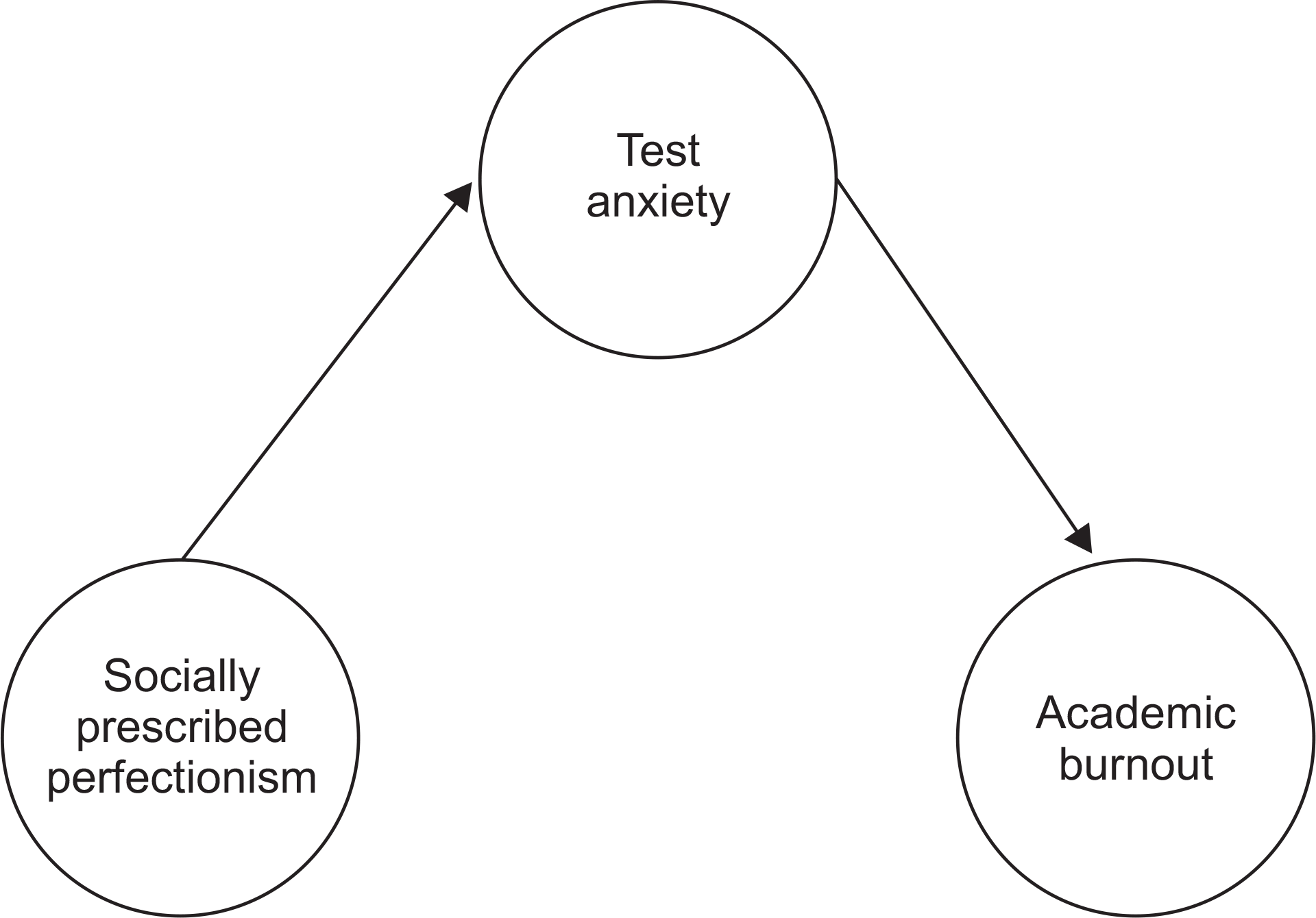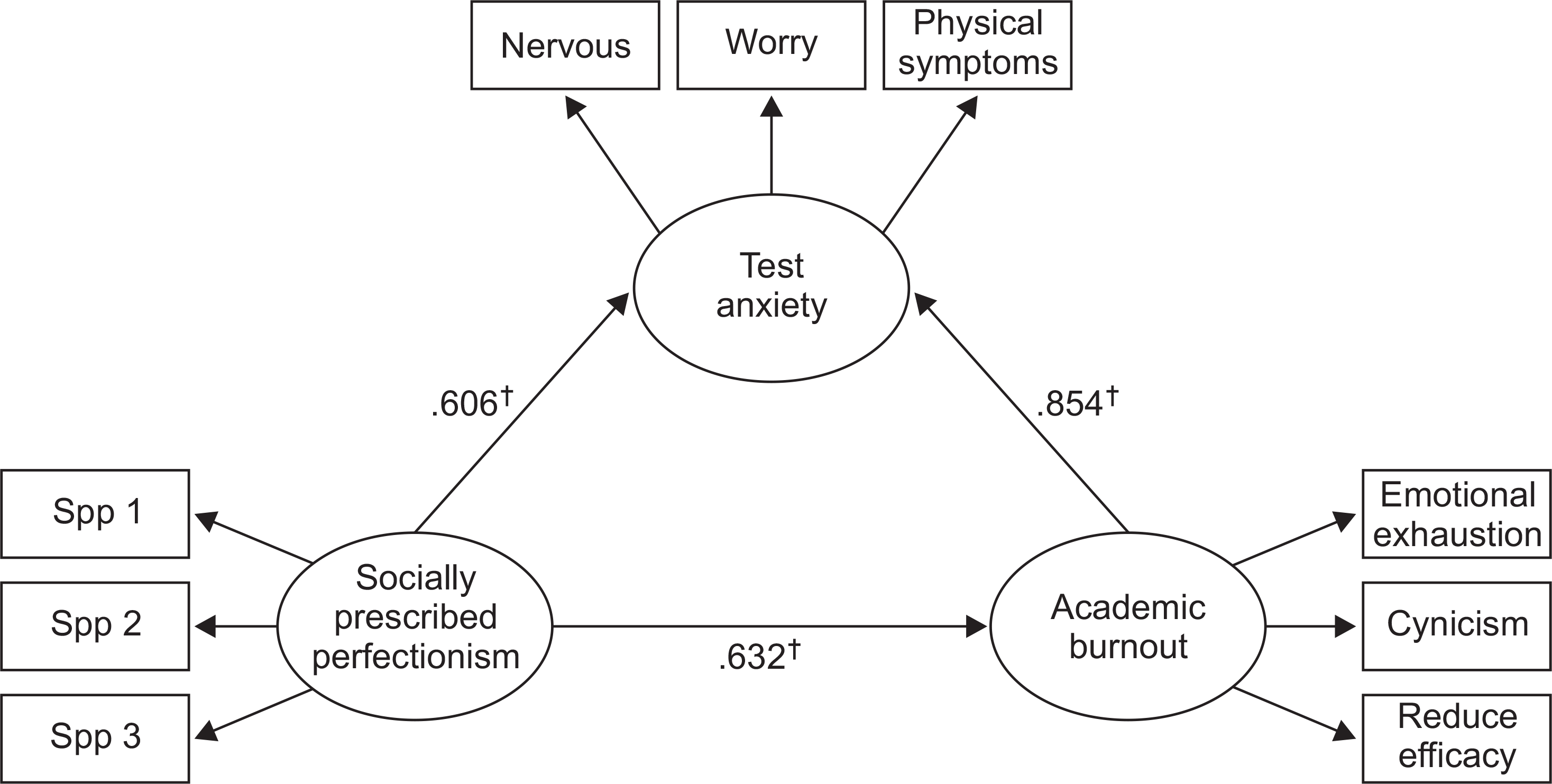Abstract
Objectives
The purpose of this study was to uncover the mediating effects of test anxiety on the relationship between socially prescribed perfectionism and academic burnout in enrolled in a dental hygiene department.
Methods
This study administered a survey consisting of the Socially Prescribed Perfectionism Scale, the Revised Test Anxiety Scale, and the Maslach Burnout Inventory-Student Survey to 310 female college students in the dental hygiene department at G City. The data were analyzed with correlation analysis using SPSS 21.0 and AMOS 20.0. partial mediating effects of test anxiety between socially prescribed perfectionism and academic burnout.
Results
The results suggest that the higher the levels of socially prescribed perfectionism, the greater the increase in academic burnout. In addition, socially prescribed perfectionism increases test anxiety when academic burnout is high. The analysis of mediating effects in the indirect path of the model revealed that adaptive socially prescribed perfectionism had a negative effect on academic burnout by increasing test anxiety. These findings and their implications were discussed.
Conclusions
In order to reduce socially imposed perfectionism, it is necessary to reduce growing academic burnout, and test the value and success criteria of this model. There remains however, the fact that there is a need to focus on career goals and criteria that need to be met in order to be successful. By lowering test anxiety, psychological stability is improved and in turn, a stable college life enables dental hygiene students to more freely access psychological support. Therefore, a proactive attitude toward education is vital in preventing test anxiety and socially prescribed perfectionism.
References
1. Misra R, Mckean M, West S, Russo T. Academic stress of college students: Comparison of students and faculty perceptions. College Student Journal. 2000; 21:1–10.
2. Gong SJ, Lee EH. Mediation effect of coping between life stress and depression in female college students. Korean J Woman psych. 2006; 11:21–40.
3. Schaufeli WB, Salanova MI, Gonzalez-Roma V, Bakker AB. The measurment of engagement and burnout: A confirmative analytic approach. J Happiness Stud. 2002; 3:71–92.
4. Salmela-Aro K, Kiuru N, Leskinen E, Nurmi JE. School burnout inventory (SBI): Reliability and validity. Eur J Psych Assessment. 2009; 25:48–56.
5. Saboonchi F. Perfectionism: Conceptual, emotional, psychopathological, and health-related implications [doctor’s degree]. Stockholm: Stockholm University;2000. [English].
6. Jo HI, Lee HA. The mediating effeds of internal-external control on the relationship between perfectionism and academic burnout. KYRA. 2009; 16:1–23.
7. Jo HI, Lee NY. A study on the relationship between academic achievement and ego-resiliency: Focusing on mediating effects of self-determination motivation. KYRA. 2010; 17:1–20.
8. Jo HI, Lee HA. The Mediating Effects of Achievement Goals on the Relationship among Perfectionism, Academic Burnout and Academic Engagement. KYRA. 2010; 17:131–154.
9. Hewitt PL, Flett GL, Turnbull-Donovan W, Mikail SF. The multidimensional perfectionism scale: reliability, validity, and psychometric properties in psychiatric samples. APA. 1991; 3:464–468.

10. Mo HY. Influence of Stress Factors and Perfectionism on Depression in an Adolescent Period [master’s degree]. Seoul: Sogang Uni-versity;2000. [Korean].
11. Hong JH. The Effect of Perfectionism on the Information Processing of the Test-Anxious students [doctor’s degree]. Suwon: Ajou Univer-sity;2002. [Korean].
12. Han KY. Multidimensional perfection: relevance of Concepts, measurement and maladjustment [doctor’s degree]. Seoul: Korea Uni-versity;1993. [Korean].
13. You SE, Kwon JH. The effects of perfectionism, social support, stress, and coping style on depression in the middle-aged woman. Kor J Clin Psychol. 1997; 16:67–84.
14. Bae BH. The effects of Self-Determination and Academic procrastination on Academic sterss:The application of multivariate latent growth modeling [master’s degree]. Suwon: Ajou University;2007. [Korean].
15. Benson J, El Zahhar N. Further refinement and validation of the Revised Test Anxiety Scale. Structural Equation Modeling. 1994; 1:203–221.

16. Cho YR. The role of metacognition in test anxiety above and beyond depression, perfectionistic concerns over mistakes, study skills, and academic self-efficacy. Kor J Clin Psychol. 2008; 27:709–727.
17. Hong SH. The Criteria for Selecting Appropriate Fit Indices in Structural Equation Modeling and Their Rationales. Kor J Clin Psychol. 2000; 19:161–177.
18. West SG, Finch JF, Curran PJ. Structural equation models with non-normal variables: Problems and remedies. Thousand Oaks: Sage Publication;1995.
19. Hu LT, Bentler PM. Cutoff criteria for fit index in covariance structure analysis: Conventional criteria versus new alternatives. Structural Equation Modeling. 1999; 6:1–55.
20. Shrout PE, Bolger N. Mediation in experimental and nonexperi-menral studies: New procedures and recommendations. Pyscho-logical Methods. 2002; 7:422–445.
21. Sim HW. (The) Effect of perfectionistic disposition on Mental Health:Base on Factor Analysis of Perfectionosm Scale [master’s degree]. Seoul: Ewha Woman’s University;1994. [Korean].
22. Choi WH, Mun YS. The Differences of Test Anxiety as A Function of Perfectionists in High School Students. KJEP. 2009; 16:1–23.
23. Kim BN. Positive mental health, the relationship between the emotional evaluation and academic emissions related to the test[master’ s degree]. Seoul: Korea University;2014. [Korean].
24. Kang S. Schoolgirl of academic stress, perfectionism, impact on the depressed communicate with parents[master’s degree]. Gwangju: Chonnam National University;2007. [Korean].
25. Choi EJ. Influence of the Perfectionism Tendency of Elementary School Students on Academic Stress[master’s degree]. Incheon: Incheonl University;2011. [Korean].
Table 1.
General characteristic of the subject
| Variables | Frequency | |
|---|---|---|
| Grade | 2nd grade | 159 (51.3%) |
| 3rd grade | 151 (48.7%) | |
| Gender | Female | 310 (100%) |
Table 2.
Description of study variables
Table 3.
Correlation among socially prescribed perfectionism, test anxiety and academic burnout
1. Socially-prescribed perfectionism, 2. Socially-prescribed perfectionism1, 3. Socially-prescribed perfectionism2, 4. Socially-prescribed perfectionism 5. Test anxiety, 6. Nervous, 7. Worry, 8. Physical symptoms, 9. Academic burnout, 10. Emotional exhaustion, 11. Cynicism, 12. Reduce efficacy. *P<.05, **P<.01.
Table 4.
Fit index of measurement model
| Fit index | χ2 | df | P | TLI | CFI | RMSEA (CI*) |
|---|---|---|---|---|---|---|
| Measurement | 76.557 | 24 | .000 | .941 | .960 | .084 (.063-.106) |
| Model |
Table 5.
Load factor analysis of measurement model
| Potential Variables | Measured Variables | B | SE | β | t |
|---|---|---|---|---|---|
| Socially prescribed perfectionism | Socially prescribed perfectionism1 | .772 | .094 | .669 | 8.239† |
| Socially prescribed perfectionism2 | .948 | .116 | .661 | 8.205† | |
| Socially prescribed perfectionism3 | 1 | .675 | |||
| Test anxiety | Nervous | 1 | .927 | ||
| Worry | 1.148 | .045 | .921 | 25.313† | |
| Physical symptoms | .890 | .046 | .806 | 19.511† | |
| Academic burnout | Emotional exhaustion | 1 | .891 | ||
| Cynicism | .791 | .058 | .821 | 13.536† | |
| Reduce efficacy | .196 | .053 | .223 | 3.693† |
Table 6.
Fit index result of research model and competing model
| Model | χ2 | df | TLI | CFI | RMSEA (CI*) |
|---|---|---|---|---|---|
| Research model | 76.557 | 24 | .941 | .960 | .084(.063-.106) |
| Competing model χ2 Varification difference | 92.649 | 25 | .927 | .949 | .094(.074−.114) Δχ2=16.092 |
Table 7.
Path coefficients and significance test of final model
| Parameter | B | S.E | β | t | ||
|---|---|---|---|---|---|---|
| Socially prescribed perfectionism | → | Test anxiety | .606 | .100 | .458 | 6.086† |
| Test anxiety burnout | → | Academic | .854 | .107 | .505 | 7.965 |
| Socially prescribed perfectionism | → | Academic burnout | .632 | .163 | .283 | 3.875 |
Table 8.
The bootstrapping results of the indirect effects of the tes anxiety in the relationship of socially prescribed perfectionism and academic burnout
| Path | Measurements | S.E | 95% CI* (Bias-corrected bootstrap) | |||
|---|---|---|---|---|---|---|
| Lower | Upper | |||||
| Socially pre-prescribed per-fectionism | Test anxiety → | Academic burnout | .232 | .039 | .163 | .320 |




 PDF
PDF ePub
ePub Citation
Citation Print
Print





 XML Download
XML Download